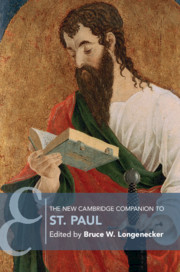Book contents
- The New Cambridge Companion to St. Paul
- Cambridge Companions to Religion
- The New Cambridge Companion to St. Paul
- Copyright page
- Dedication
- Contents
- Map
- Contributors
- Abbreviations
- Part I Paul, Letters and Communities
- Part II The Pauline Letter Collection
- Part III Paul’s Theological Discourse
- 9 What Did Paul Think Is Wrong in God’s World?
- 10 What Did Paul Think God Is Doing about What’s Wrong?
- 11 What Did Paul Think God Is Doing in Christian Communities?
- 12 How Did Paul Read Scripture?
- 13 Did Paul Abandon either Judaism or Monotheism?
- 14 Why Were People Attracted to Paul’s Good News?
- 15 How Was the Reception of Paul Shaped in the Early Church?
- 16 What Makes Paul Challenging Today?
- Bibliography
- Index of Biblical and Ancient Writings
- Index of Modern Scholars
- Cambridge Companions to Religion (continued from page iii)
- References
11 - What Did Paul Think God Is Doing in Christian Communities?
from Part III - Paul’s Theological Discourse
Published online by Cambridge University Press: 19 June 2020
- The New Cambridge Companion to St. Paul
- Cambridge Companions to Religion
- The New Cambridge Companion to St. Paul
- Copyright page
- Dedication
- Contents
- Map
- Contributors
- Abbreviations
- Part I Paul, Letters and Communities
- Part II The Pauline Letter Collection
- Part III Paul’s Theological Discourse
- 9 What Did Paul Think Is Wrong in God’s World?
- 10 What Did Paul Think God Is Doing about What’s Wrong?
- 11 What Did Paul Think God Is Doing in Christian Communities?
- 12 How Did Paul Read Scripture?
- 13 Did Paul Abandon either Judaism or Monotheism?
- 14 Why Were People Attracted to Paul’s Good News?
- 15 How Was the Reception of Paul Shaped in the Early Church?
- 16 What Makes Paul Challenging Today?
- Bibliography
- Index of Biblical and Ancient Writings
- Index of Modern Scholars
- Cambridge Companions to Religion (continued from page iii)
- References
Summary
For Paul, the social ethos of Christian communities grows directly out of Christ’s movement into the sphere of sin and death, there to rescue derelict humanity through the radical solidarity of the cross and the power of the resurrection. This movement reverses hierarchies and destabilizes social norms, in visible, counterintuitive ways: the inclusion of socially incompatible members, the redistribution of resources, solidarity with all humanity in its most desperate cry for liberation, and the creation of a fellowship in which diverse people with divergent backgrounds and different gifts grow together into moral agents shaped by Christ’s self-giving love.
- Type
- Chapter
- Information
- The New Cambridge Companion to St. Paul , pp. 210 - 224Publisher: Cambridge University PressPrint publication year: 2020



